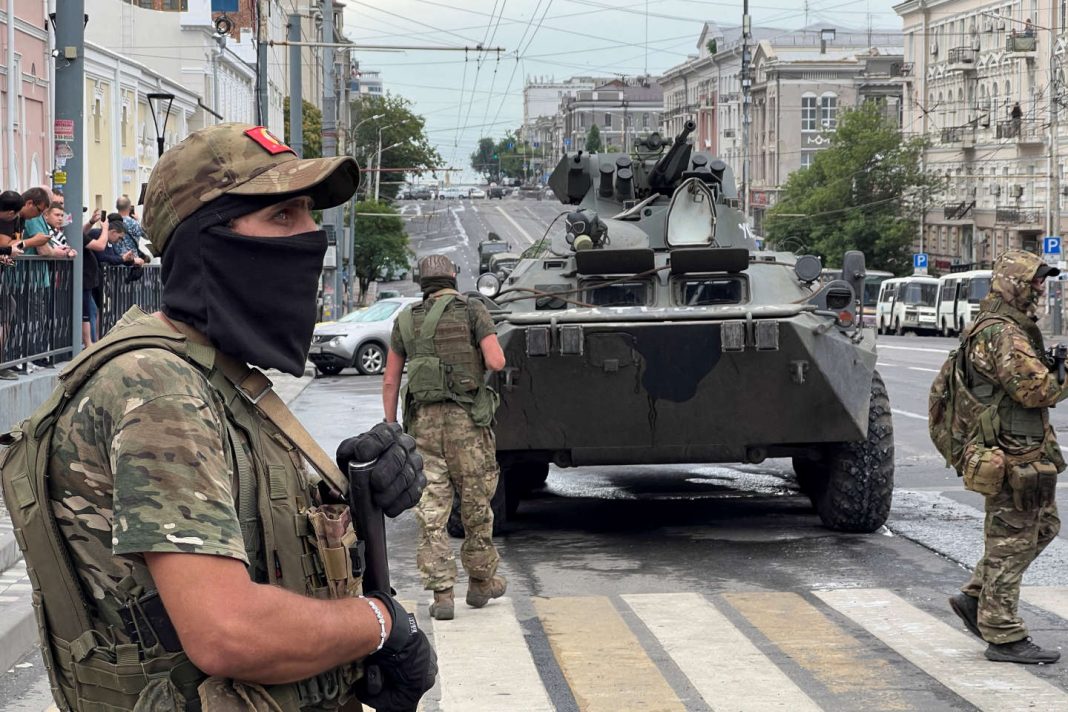The armed rebellion that began on June 23, 2023, with the participation of Wagner PMC, raises many questions. It is known that, in terms of business, Yevgeny Prigozhin entirely depends on government contracts (because of food supplies to Russian schools). Foreign contracts are also fully approved and coordinated at the state level. Politically, Prigozhin is embedded in the system and is a link in the vertical system of the Kovalchuk family clan, with close ties to the head of Rosneft, Igor Sechin. Prigozhin has known Putin since his days in St. Petersburg. He never entered the inner circle of Putin’s confidants. Still, he was considered a faithful executor of the will of the “Master,” agreeing to carry out rather dubious assignments. The informal status of “Putin’s chef” demonstrated a privileged position in the Russian establishment.
At the same time, the very fact of the beginning of the rebellion, and there is no other way to call the situation with the presence of armed people on the streets of Russia, already demonstrates the presence of a serious crisis within the system. The question remains only how this crisis is controlled and what consequences it can lead to.
In this article, Ascolta analyses the key events and determines the possible consequences of the so-called justice march performed by PMC Wagner.
This Content Is Only For Subscribers
For a long time, Prigozhin had a severe conflict with the Ministry of Defense of the Russian Federation and the General Staff of the Russian Armed Forces, personally with Sergei Shoigu and Valery Gerasimov. Shoigu and Gerasimov did not consider Prigozhin and his Wagner PMC a serious military force, especially since Russian law does not allow private military campaigns. Prigozhin’s excessive focus on his own “army,” an attempt to informally show that PMCs are more successful and effective than regular troops, led to an inevitable conflict between Wagner and the Ministry of Defense. This was expressed in Prigozhin’s campaign against General Lapin, Gerasimov’s favourite, and the information campaign around Bakhmut, where Wagner suffered significant losses. Prigozhin often blamed the Ministry of Defense for this.
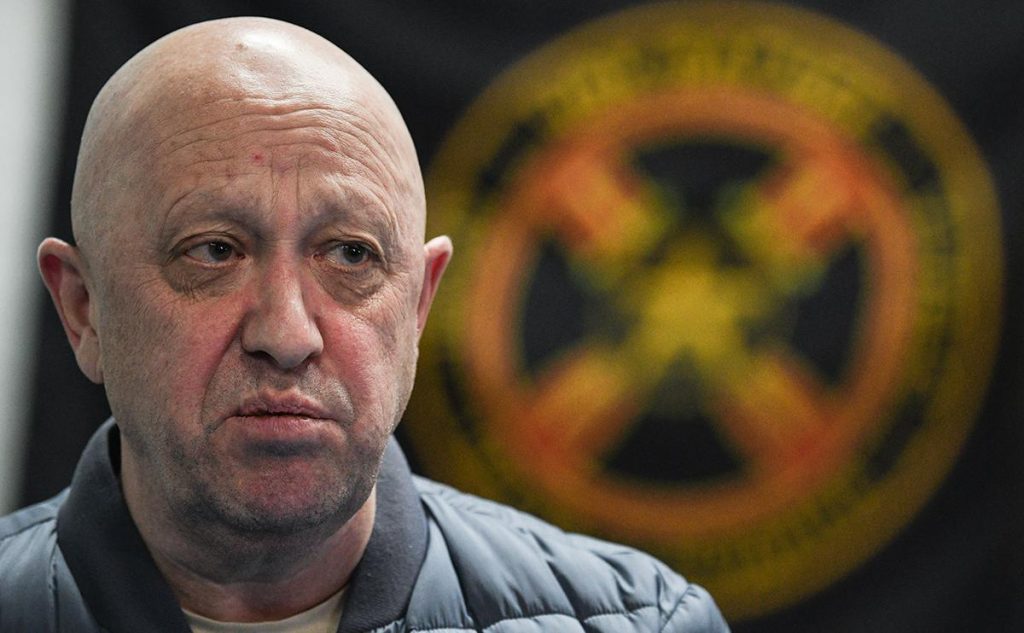
Significantly, Prigozhin’s political rating began to grow. Sergei Kiriyenko, Deputy Head of the Presidential Administration, seriously considered Prigozhin as a possible convenient sparring partner for Putin in the 2024 presidential election (as the image of a “hawk” in Russian politics, under whose banner the most radical and militant forces would gather, leaving Putin the niche of a “peacemaker”). This combination, at first glance rather primitive, should, according to Kiriyenko, determine a more positive disposition of the West towards Putin. Ascolta has repeatedly mentioned the possibility of using a similar formula in the upcoming presidential campaign. At the same time, it is already becoming clear that if such a format was worked out, now it would have to be abandoned.
Organisationally, Prigozhin and Wagner were subordinate to the commander of the Special Operations Forces, General Valery Flustikov. Flustikov, although he is the deputy of Admiral Kostyukov, the head of the Main Directorate of the General Staff of the RF Armed Forces, actually reports directly to Putin. That is, “Wagner” could be considered Putin’s favourite toy. Information has repeatedly appeared about Prigozhin’s rapprochement with the commander of the Russian Guard, General Zolotov.
Recently, however, Prigozhin has become so involved in the role that he has become weakly controlled. Attempts to impose a ban on the mention of Prigozhin and “Wagner” on television channels and in the media, the refusal of Prigozhin to obtain the contract he needed for the supply of food for the RF Armed Forces, the campaign of criticism, and even ridicule of Prigozhin in the information field of Russia had little effect. Prigozhin was even offered to focus on Africa and Latin America, where the services of Russian PMCs are now in demand, but this did not help. The parallel creation of dozens of smaller private military companies did not shake Wagner’s position in this market segment. In addition, numerous military correspondents began to work with Prigozhin, who often broadcast the role of Prigozhin, not the Ministry of Defense. And even Putin’s recent meeting with the military corps – with the wishes of “a more objective assessment of military reality” – had no effect.
It looks pretty natural that Prigozhin was provoked to speak, that he was not prepared, and that the initiators carefully calculated Prigozhin’s behavioural characteristics and psychology. At the time of the beginning of the rebellion, Prigozhin himself was in St. Petersburg and urgently flew south only after he received information about the shelling of Wagner’s rear bases by rockets (the Ministry of Defense strongly denies the shelling, although Prigozhin himself is sure that the order was given personally by Shoigu, who left Rostov-on-Don immediately after the shelling). This was preceded by a week-long campaign regarding the need for the Wagnerites to sign contracts with the Ministry of Defense (that is, it was about subordinating the Wagner to Shoigu). The telegram channels suggested that Shoigu wanted to dissolve Wagner or take over the company in a raider way. This idea was heard by Prigozhin for several days, causing him nervous reactions.
On the eve of the provocation, a counter-terrorist operation regime was introduced in many cities of the Russian Federation – according to the FSB, “to search for and neutralise Ukrainian sabotage groups.” Military equipment was pulled to large cities, and the garrisons were brought to a state of readiness. The appearance of checkpoints at city entrances was not formally connected with Prigozhin’s rebellion.
An interesting point: on June 14, the head of the administration of the city of Rostov-on-Don received a notification from the regional representative of Wagner PMC in the Rostov region about holding several actions on June 24, including a motor rally, allegedly to attract volunteers and patriotic education of youth. Formally, Prigozhin’s actions do not even violate public order.
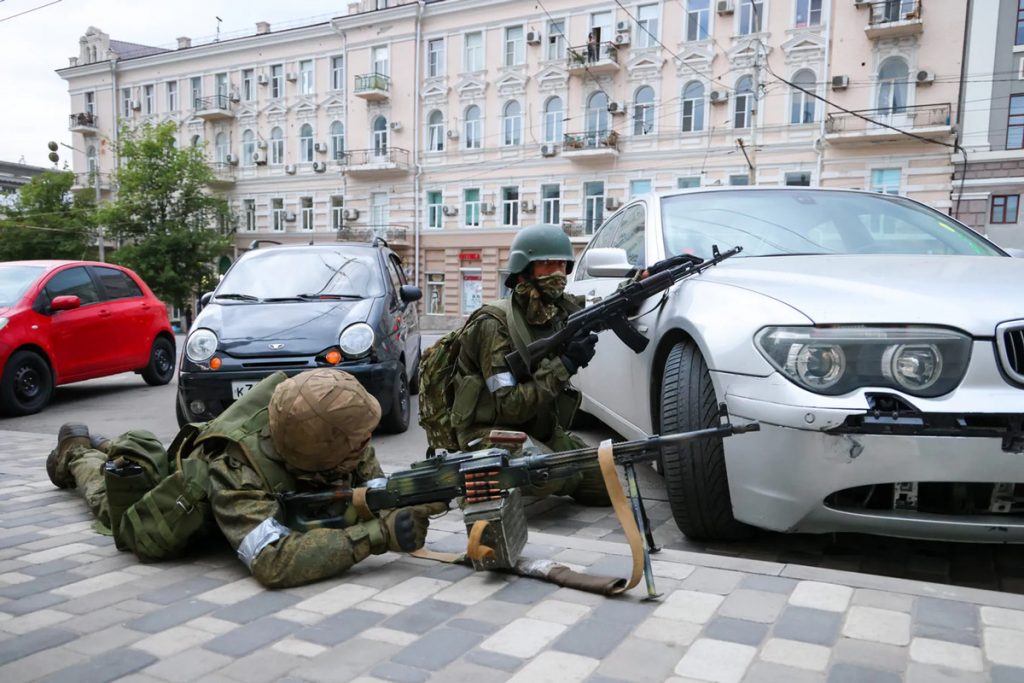
Prigozhin’s march to Rostov-on-Don and the personalisation of the conflict (demands to extradite Shoigu and Gerasimov) while diligently avoiding criticism of Putin personally (who is the Supreme Commander-in-Chief) shows that Prigozhin is trying not to cross a certain line. The rebellion also suggests that Prigozhin was used as a battering ram in the battle between the “Kremlin towers” (most likely, this is an attempt by the Kovalchuk group to carry out cleansing operations in the army and put their own people at the head of the defence department and the General Staff). In this case, Sergei Chemezov, with his built architecture inside the government, would most likely have been hit.
For more than 12 hours, Putin remained silent. Most of the officials were also silent. The conspirators, most likely, counted on the fact that Putin would make a conciliatory statement – they say, in a war, it is not worth rocking the boat, I am removing all the participants in this action (both Shoigu and Gerasimov, and Prigozhin) until the circumstances are clarified, and temporarily appointing other, more compromising individuals. Judging by this, Putin initially leaned towards this option of address (this can be judged from some statements by Dmitry Peskov).
However, by morning, Putin was convinced that Prigozhin’s rebellion was a personal challenge to him and perhaps an attempt to divert attention from the process of overthrowing the Russian president. This version seemed convincing to Putin. Moreover, according to information received from Ascolta’s sources, he was depicted with the sad fate of Nicholas II with correctly placed accents: Putin has been ruling for the 23rd year (fatal for Nicholas, and Putin believes in signs and omens), and in both that event “found” the British trace, Prigozhin began his active operations on the anniversary of the invasion of the Napoleonic army into Russia (June 24, 1812). With his obscurantism, shamans, and deer antler baths, for Putin, Shoigu has already occupied the niche that Rasputin took place for Nikolai (with his famous prophecy “I will not exist and so will you”).
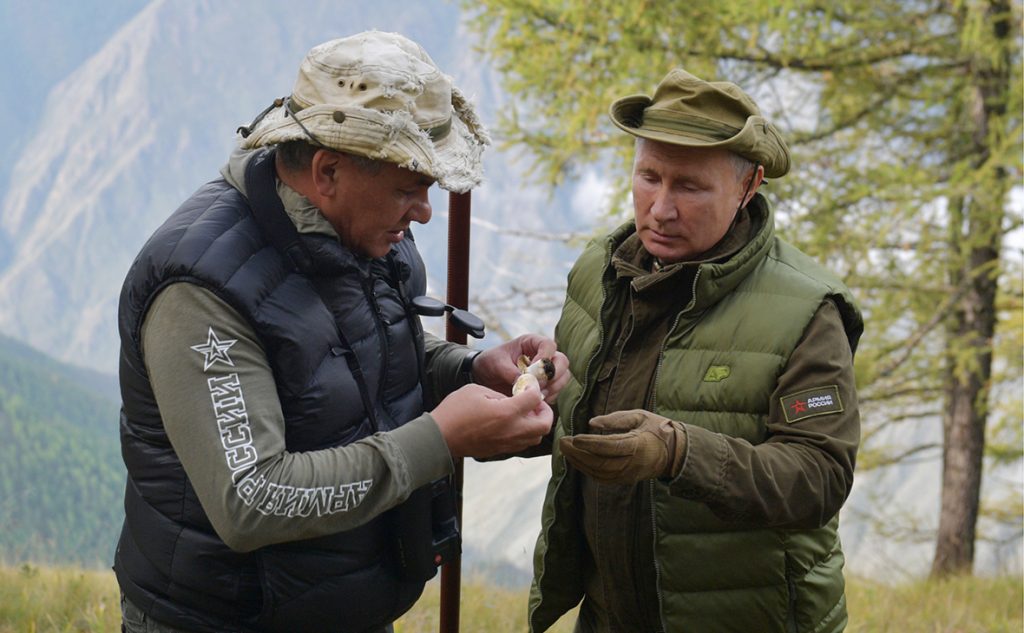
The mixture of these factors led Putin to perceive the Prigozhin rebellion as a personal threat and issue an angry statement. In it, he called the rebels traitors and set the task of eliminating the rebellion. Although one cannot reject the option in which Prigozhin’s rebellion and Putin’s speech are elements of pre-election technology: Putin demonstrates masculinity, accepts the challenge, and suppresses the rebellion against legitimate authorities.
Interestingly, officials, bureaucrats, and close to the Kremlin opinion leaders began to comment on the situation only after Putin’s speech (as they were also waiting for the reaction of the head of state). The Western states are in a challenging situation: they cannot directly support Putin in this confrontation. However, they understand his legitimacy as a president, and keeping his overthrow is dooming them to the fact that a more challenging and unpredictable politician will come to power.
Suppose Putin partially recovers Prigozhin’s line and removes “parquet” generals from the army’s leadership. In that case, this will be a very alarming signal for Ukraine and the West: firm and not limited by any fuses of people who set goals and disregard the methods of their achievement.
After Konstantin Goloshchapov (Putin’s massage therapist) escaped from Russia last year, Prigozhin’s rebellion is the second blow from people considered close to Putin in St. Petersburg. Realistically, serious personnel purges may begin shortly in Putin’s entourage and Russia’s highest government. At the same time, representatives of the old St. Petersburg team, on which Putin has relied for almost a quarter of a century, may fall.
Today there is not a single factor that could give rise to talk about the possible success of the rebellion. But regarding state governance, Russia is in for a serious storm. The government is losing credibility and solidity. Perhaps, soon, echoes of the Prigozhin rebellion are possible in other aspects of the country’s life: in economic, regional, and other areas. Judging by the available data, the vast majority of the Russian population is not on the side of Prigozhin, they do not understand the essence of the conflict, and Prigozhin has not formulated either his economic program or slogans understandable to the population. In addition, a person with a criminal past is unlikely to evoke sympathy among most of the population (even those with previous convictions). Not on the side of Prigozhin and the security forces, who maintain an oath of allegiance to Putin.
With a high degree of probability, it can be assumed that the planned legalisation of the activities of PMCs in Russia as part of military reform will not occur.
Today, there is no need to discuss the development of Prigozhin’s rebellion into something more. The social basis for mass unrest has not matured. It is also too early to talk about a coup d’état and a rebellion as the first stage of this process. Putin had time to prevent a pessimistic scenario for himself. It is also too early to talk about the influence of the rebellion on the combat effectiveness of Russian troops on the territory of Ukraine – the “Wagnerites” did not enjoy special prestige among the fighters of the Russian Armed Forces; they were considered “convicts who receive a lot of money.” And if tomorrow, PMC “Wagner” is disbanded and its fighters are sent back to prisons, this can only contribute to the growth of morale and positive sentiments in the Russian army.
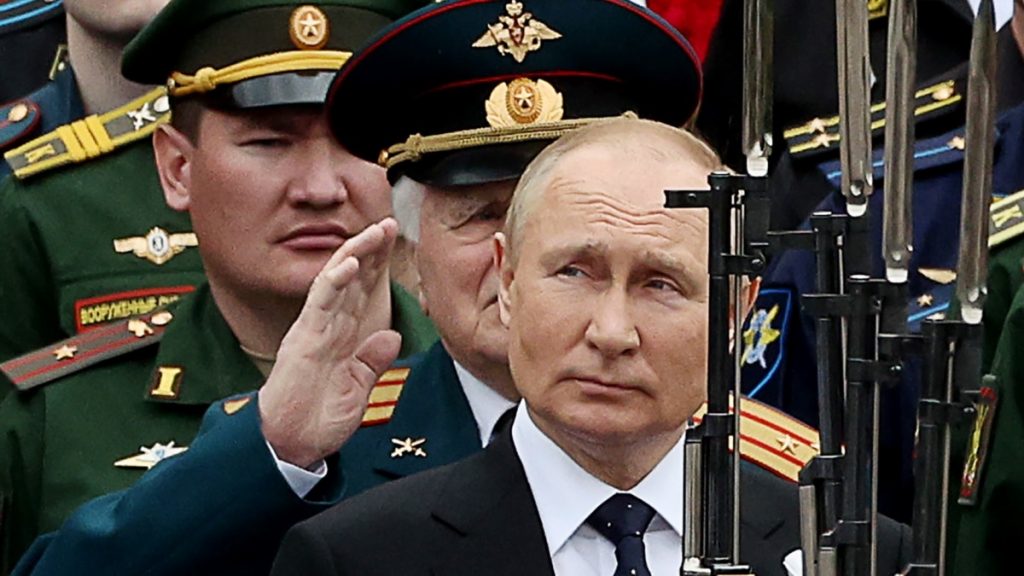
At the same time, it is essential to pay attention to several changes in the legislative framework of the Russian Federation that have occurred in recent months. Under the precise control of Putin, changes were made to the legislation on martial law and counter-terrorism measures, and the positions of the FSB, FSO, and the National Guard were strengthened. An analysis of such changes suggests that the Kremlin was gradually preparing for a more severe immersion of the country into wartime.
Now, one of the key theses sounding in the information space of Russia is “cohesion,” which is called for and demonstrated.
It is possible that Prigozhin’s rebellion and its suppression may lead to a new stage in the escalation of the conflict, including direct aggression against NATO.
However, martial law in Russia and extended mobilization can be expected in the near future (Putin’s mobilization decree signed in 2022 is still valid, but the clause on “partial mobilisation” may be removed from it).

